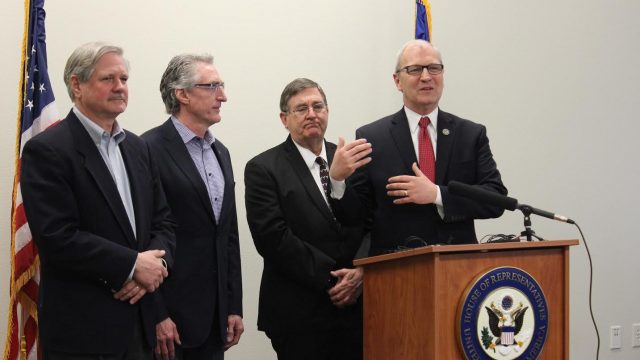Rep. Kevin Cramer: Healthcare Reform Must Encourage Innovation

Within the next few weeks, the House Energy and Commerce Committee, of which I am a member, will begin drafting the first legislation to repeal and replace Obamacare. Voters in November sent a clear message that this must be a top priority this session of Congress.
In the seven years since Obamacare was enacted, it has failed to deliver on its core promises. Health insurance markets are collapsing, premiums and deductibles are soaring, and patient choice is dwindling. Now in a death spiral, Obamacare will fail on its own if we don’t take action. Congress is now ready to focus on solutions as we begin fixing something clearly broken with a new system offering more choices, lower costs, and greater control of health care by individuals.
As I travel across the state, North Dakotans often share with me how Obamacare has affected their lives. Last week I brought Congressman Mike Burgess, M.D., of Texas to Bismarck to listen to state leaders at a health care reform roundtable where we were joined by Senator John Hoeven and Governor Doug Burgum. As the most senior medical doctor in Congress, the chair of the Energy and Commerce Health subcommittee and a key architect of health care reform, it was imperative that Congressman Burgess hear the perspective of those providing health care in this rural state.
[mks_pullquote align=”right” width=”300″ size=”24″ bg_color=”#ffffff” txt_color=”#000000″]This year, new administrators at key federal agencies, such as the Department of Health and Human Services, will provide immediate relief by lifting many of the most onerous Obamacare regulations.[/mks_pullquote]
And their message to him? Whether hospital, clinic or nursing home administrator, health insurance provider, state official, legislator or patient and consumer advocate, it was clear and consistent. To them, meaningful health care reform can only come with significant regulatory relief, more state flexibility and greater patient choices.
Over and over we heard comments about innovation. These were North Dakotans talking, people to whom innovation is second nature. They are professionals living in a state with weather extremes, constantly changing commodity prices, and long distances to navigate for basic services. Their circumstances do not remain constant, and every day’s new challenges bring the obligation of innovation to adapt and modify to survive.
This year, new administrators at key federal agencies, such as the Department of Health and Human Services, will provide immediate relief by lifting many of the most onerous Obamacare regulations. This will give state administrators more resources and greater flexibility to design the best programs, including a Medicaid safety net, for North Dakota’s most vulnerable.
In Congress, the first legislation we will consider will be in a reconciliation bill to repeal significant portions of Obamacare, implement a period of stability for patients, and include some replacement provisions. Health care reform will continue to cover pre-existing conditions and keep children on their parents’ policies to age 26. And we will focus on greater consumer-driven options like expanded health savings accounts.
Following that, Congress will consider separate legislation to strengthen insurance markets and address other related concerns. During our roundtable discussion, Insurance Commissioner Jon Godfread’s comments reflected North Dakota’s perspective well. “I hope new legislation will give power back to the states and let us create plans that work for our people. As a small state, we can be nimble and reinvent programs that could lead the nation,” he said.
We are fortunate to have in North Dakota a governor who has spent his life championing innovation and has brought that background to state government. The message Congressman Burgess, Senator Hoeven and I will take back to Washington as we tackle health care reform is to pass legislation that lets North Dakotans be North Dakotans and use their innovation to shape the best patient-centered program for the people in our state.




